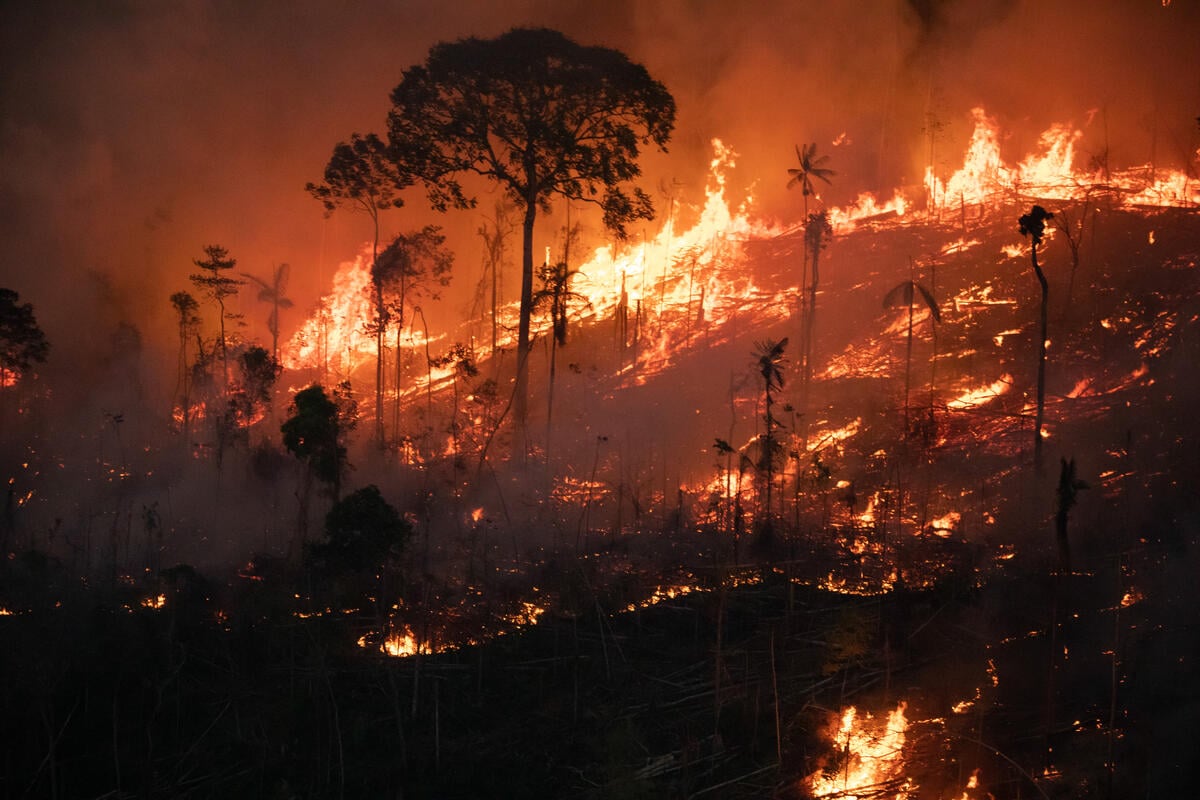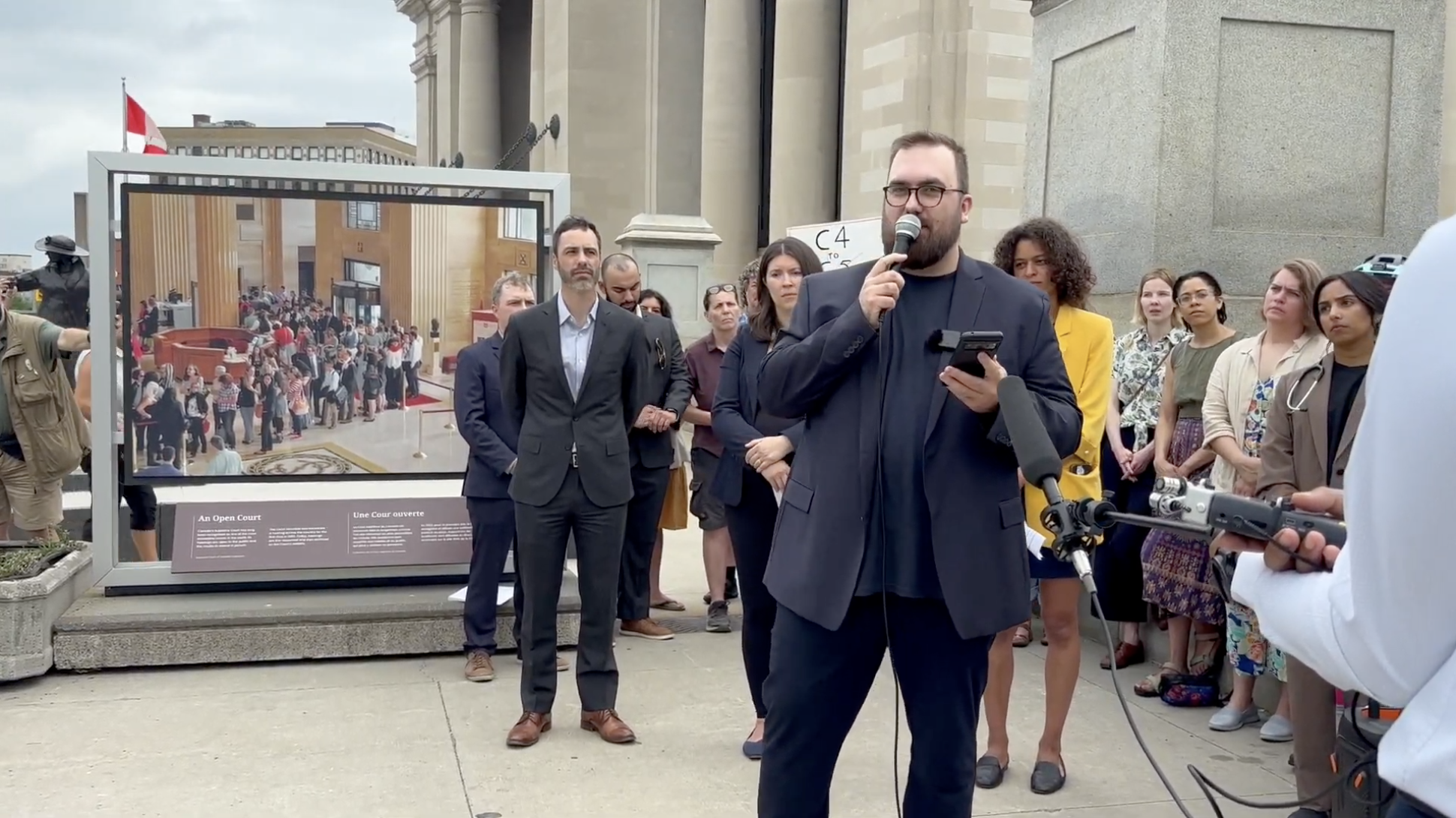SKIP THE INTRO: TAKE ME TO THE CLIMATE ANXIETY TIPS
“The moon is following us home again!” My daughter exclaimed as she always does when the line between day and night becomes blurry and we begin to make our way home from the park in the evening. “But why is it red?”
Her question hit me with the weight of the realization that with the moon, the climate crisis, too, is following us home. I explained that there were wildfires burning in Ontario and the smoke was blowing particulate matter through the atmosphere, turning the moon a red hue. “Will they come here?” she inquired, referring to the fires. “No” I said, (not yet, my inner voice added).
This was on the day that Toronto’s air quality clocked in at second worst of any city in the world. And it was one of those moments when the climate crisis crystalized in my mind as an overwhelming reality – the extent of the damage, the monumental task in front of us. The fact that others living in more vulnerable circumstances around the world have already been dealing with the impacts for years – and despite that knowledge, we’ve failed to act with the urgency the situation requires.
As our newsfeeds fill with videos and images of wildfires raging out-of-control and floods that threaten to wipe towns off the map; as news headlines turn dark with stories of animals cooking in place and cherries turning to raisins from record-breaking heat; as more people are directly exposed to the impacts of the crisis – the sense that the task at hand is overwhelming and impossible can lead to feelings of climate anxiety, or ‘Eco-Anxiety.’
These feelings are normal. We’re being confronted with horrible images, videos and stories in our newsfeeds, events which are increasingly being directly tied to climate change through more accurate climate science. More of us are also directly experiencing the impacts first hand. It’s natural to feel grief, despair, anxiety, depression and anger when faced with such suffering – and the infuriating inadequate responses to such events from those in power.
As someone who lives in the flow of information online working as a Digital Campaigner for Greenpeace Canada, I inevitably struggle with these feelings. But over the years I also feel like I’ve learned a thing or two about managing them, moving through them and coming out the other side, transmuting eco-anxiety into action. I’m sharing some of this here in the hopes it might help if you, like me, struggle with feelings of doom in a world that feels increasingly destabilized.
1. Get outside
When I find myself in a pit of climate doom, I make a conscious effort to disconnect from the screen world and spend time in nature. I go for walks, I sit in parks, I swim, I stop by some of the butterfly way projects that are near me and commune with the bees and the butterflies. There is nothing like the calming effects of the natural world – and spending time in it is a reminder that we are deeply intertwined with this world. We are not apart from nature, but a part of it. There is something incredibly healing (and empowering) when you let yourself sit in that knowledge.
Research has also confirmed what we all know intuitively: spending time in nature has positive mental health benefits. This is something more people have discovered since covid lockdowns, and all the more reason that ensuring natural spaces are available to all needs to be a priority for a green and just recovery.
2. Cook, clean, garden
Being a full time digital activist means I live in the flow of world events online – what these days feels increasingly more like a rapid raging river with a rip tide. The trending hashtags, the photos and videos of all “climate-hell-broke-loose” looking more like a dystopian movie, oil companies admitting to covering up climate science to continue turning a profit, politicians giving callous remarks about the suffering of the vulnerable in the midst of a climate crisis, billionaires playing star wars using the money they hoarded destroying the only home we’ve got – and then having the nerve to say they’re giving our children the opportunity to build the future.
It’s important to know what’s going on in the world, but it’s also important to know when you’re coming untethered.
When I feel myself getting lost in the rip tide, I take a break and find activities that ground me again. I do laundry and hang it outside, I cook or bake, I water my garden, I clean my apartment, I read, I play my ukulele.
Find an activity that restores a sense of calm and allows you to find your centre again. This will lead you to being more effective when you’re ready to jump back in. We are not at our best when we’re burned out and scattered; it’s better to take breaks, rest and realign.
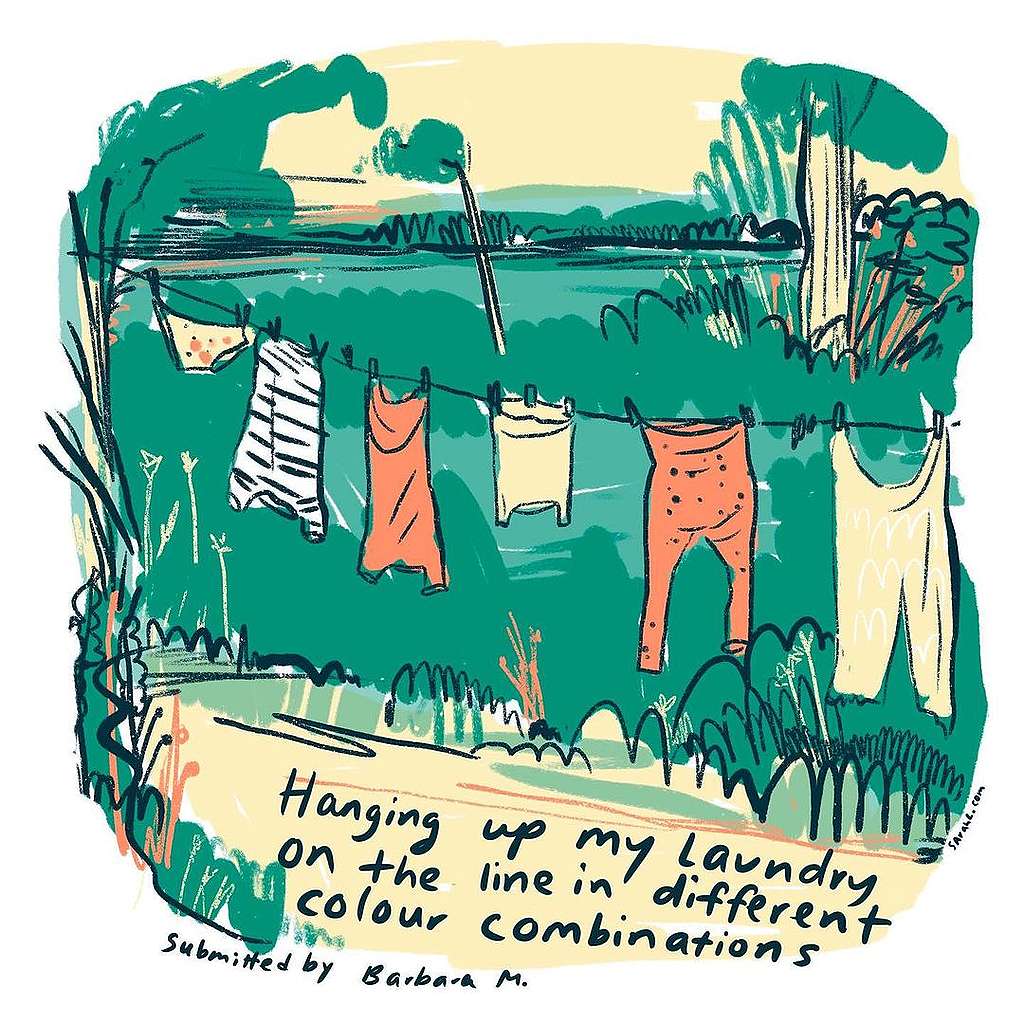
3. Tailor your newsfeed to include positive stories…and funny animal videos
Set yourself up to run into the good equally (or more) often than the bad. Being exposed to global disasters and negative news stories all day every day can leave us feeling like there are more problems than solutions. But the solutions, and the people working on them, are out there (for example, this story about a seaweed farm off Cortes Island makes me want to give it all up tomorrow and become a seaweed gardener ?). Start looking for the groups and the projects that inspire you, and follow along with their work. Make sure you’re taking note of the wins as often as you’re keeping up with what more needs to be done (for instance, in the last couple of months, people power managed to stop not one, but two pipelines – GNL Quebec and Goldboro – and also saved a wetland from demolition). They’ll continue to try to pave paradise, and we’ll continue to stand in their way.
Here’s a few places to start:
- @brenna_quinlan and @sarah_lazarovic on Instagram (Sarah also writes this inspiring newsletter)
- @futureearth on Instagram
- @gogreensavegreen on instagram
- @get.waste.ed on instagram
- A Positive Climate podcast
- Upstream Podcast
And don’t forget to expose yourself to inspiring and/or funny animal videos. These are essential in surviving climate anxiety (I post one every Saturday morning on the Greenpeace Canada social media channels, follow along! Facebook, Twitter, Instagram).

4. Talk it out…with your elected representatives
On top of everything else we’re all struggling with in these uncertain times, we’ve just been plunged into a federal election. Regardless of how you’re feeling about it, this is an opportunity to make climate change and social justice THE key issues – and the centre point of The National Conversation.
So – feeling upset about the state of the planet, and the increasingly unequal social system that harms the most vulnerable? Pick up the phone and give your elected representatives or candidates an earful about what you want to see ?️☎️ Think of it as a form of talk therapy. And technically you pay them to solve your problems through your taxes – so why not get your money’s worth? ?
We’ve heard a lot in the last year and half about ‘building back better’ from the pandemic for a green and just recovery. A lot of promises have been made. But so far, not as much tangible and concrete action has been taken to get us there. When you call your elected representatives, feel free to talk to them about the following:
- A fair transition to a sustainable low-carbon economy
- Protecting and restoring of land, freshwater, and ocean ecosystems along with the wildlife that call these places home
- Ending single-use plastics in favour of building a circular economy
- Replacing toxic chemicals used in agricultural, consumer goods and manufacturing with safer alternatives
- Developing accessible, affordable and healthy communities and transportation networks
- Prioritizing social and racial justice, economic equity, and well-being, in partnership with Indigenous Peoples and the communities most exposed to environmental harm
- A wealth tax on the super rich to make them pay their fair share of a green and just recovery
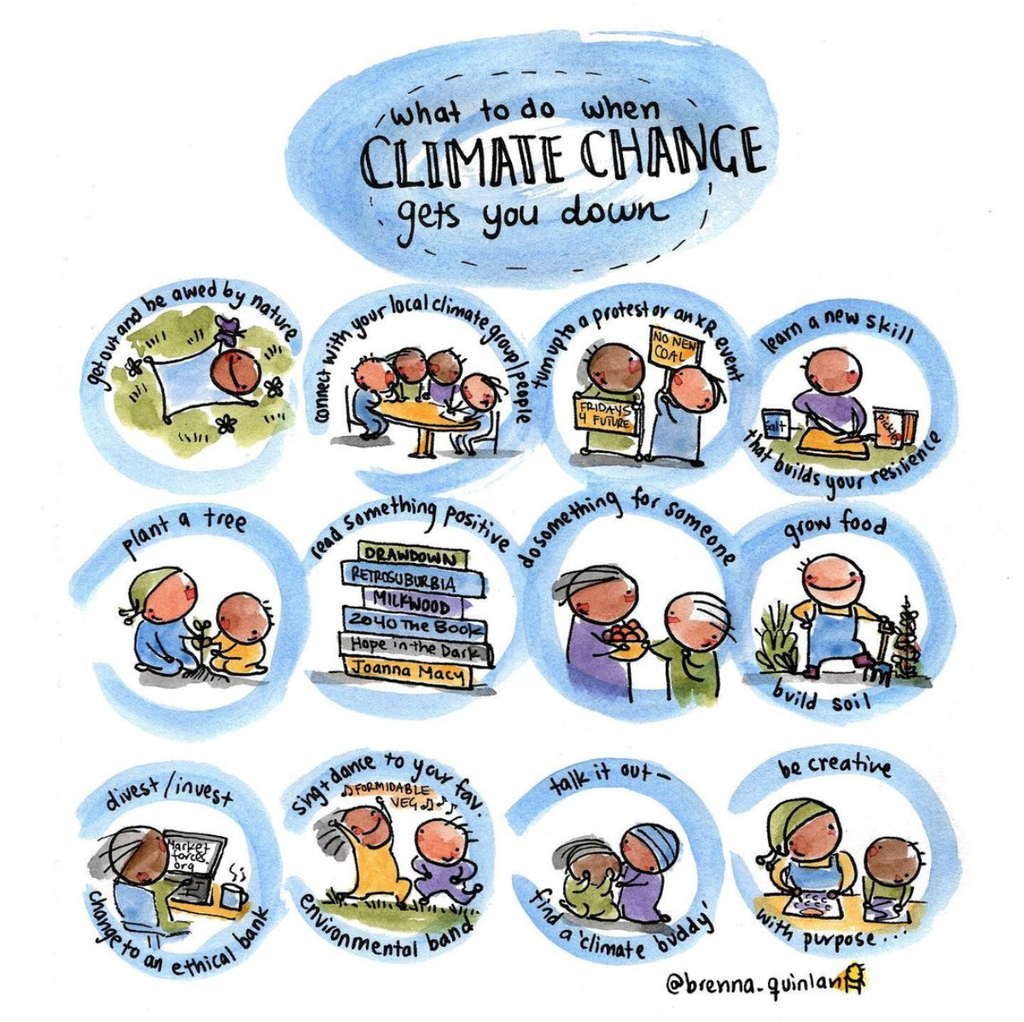
5. Take an action, any action
Just as climate anxiety can cause a vicious circle of despair, acting on climate can create a virtuous circle of empowerment.
The ultimate cure for climate anxiety – at least for me – is action.
The helplessness that comes with feelings of existential dread around climate can leave you feeling like there’s nothing you can do. And we know that’s not true: of all the things laid out in the IPCC report the one that stood out to me the most was that it’s not too late:
“If we reduce emissions to Net Zero by 2050, we can keep temperatures close to 1.5C.” – @ipcc Working Group, Co-Chair Dr. Valérie Masson-Delmotte
We already have many of the solutions we need to get there: Regenerative agriculture rooted in Indigenous knowledge of food systems; redesigning cities not around cars but around good public transport, walking and biking; replacing single-use packaging with sophisticated reuse systems; ensuring that our stuff is made to last and can be repaired rather than replaced; renewable energy; restoring and protecting what protects us: Nature.
There is no shortage of solutions, and the people pursuing them are just an internet search away. But you need to start somewhere, and often that first action is an entry point to a journey that will take you where you need to be.
Find the issue that resonates with you, start with what you’re passionate about – and take one first step. It might be picking up litter off the street each day or slowly replacing single-use items in your home with reusable ones. It might be committing to getting what you need from the secondhand market rather than buying new. It could be calling political representatives on the daily to give them an earful about the type of climate action you want to see. It could be searching for climate action groups that you want to become involved with. Whatever it is, just take the first step. I guarantee you it’s more powerful than you think it is.
6. Come together, right now, over climate change
Our socioeconomic system is not built to foster community: in fact, the opposite. It is predicated on individualism and hierarchical power structures (this is where phrases like ‘pull yourself up by your bootstraps’ come from, normalizing the notion that it’s a dog-eat-dog world out there and we should just accept our fate while stepping all over each other on our scramble to the top). These myths prop up the notion that the system we live in now is inevitable, that human beings are selfish and greedy by nature – and therefore there’s no other possible way. But research has been challenging this narrative: Anthropologists and evolutionary biologists increasingly assert that for 90% of the time our species has been anatomically human, we lived in communal, egalitarian social structures rooted in reciprocity and cooperation. That ‘social selection’ – the process by which behaviours that serve the needs of the group rather than individuals – played a large role in the survival of homo sapiens. Maybe we can call on these very traits that were socially selected for all those thousands of years ago to help us survive this particular moment in our evolutionary history, too.
The individualism and lack of communal support that runs through most of the institutions that make up the infrastructure of our society is a central aspect of what keeps the infinite growth extraction economy going. And it’s far from inevitable: it can be challenged.
One of the best ways to manage climate anxiety also happens to be one of the best ways to confront this system: connect with others and build community. This is effective for three main reasons:
- Knowing we are not alone in tackling something that feels so big immediately makes it seem more manageable. Seeing other people join together with you to take on the work feeds into that virtuous circle and can be extremely empowering.
- We are stronger together. Whatever your message is, it’s going to be amplified many more times over the more people are shouting it together.
- Building communities of care outside the aggressive, competitive market system is already laying the foundation for a society that cares for people and lives in balance with the natural limits of the planet. As systems scientist Donella Meadows said, you don’t force systems to change, you dance with them. Building community is a way to dance the new world we all know is possible into existence.
Building community can come in many different forms. Here are some ideas to get you started:
- My journey into the activist world began with meeting a group of people who were interested in building the infrastructure that would help cut back on individual consumption patterns: We opened the Toronto Tool Library (like a book library but for stuff!), hosted community swaps (think clothing swaps, gift swaps, art swaps, etc), ran DIY and upcycling workshops and hosted free repair events. Find a lending library to get involved with near you!
- Join an organization working on systemic solutions to the climate crisis, like Greenpeace! Greenpeace also has local volunteer groups across the country who come together to take direct action (Connect with them here: Montreal – plus ones for McGill University here and here – Sherbrooke, Clarington, Winnipeg, Toronto, Ottawa, Vancouver, Hamilton, Victoria, Halifax,). If there isn’t a local group in your area, and you’re interested in starting one, get in touch with us and we’ll help!
- You could join a community garden or a group looking to make growing local food more accessible or start get involved with the No Mow May Movement to increase biodiversity and ecosystems for pollinators.
- Join a community beach cleanup or a street cleanup. Great Canadian Shoreline Cleanup helps you set up/locate them. A Greener Future also organizes and runs them.
- Help with waste audits, which are tactics communities can use to hold big polluters responsible for their enormous contribution to the waste crisis
- Join a Boomerang Bags group and start learning how to make reusable bags out of upcycled material to distribute in your community
- Get involved with the Repair Cafe movement (either bring an item to get it fixed, or volunteer with your local repair cafe. If there isn’t one near you, you could start your own!)
- Got kids? Set up or get involved with a babysitting co-op
- Set up a time banking system for your community
- Start hosting local community swaps, or using trading platforms like Bunz Trading Zone
- Join your local Fridays for Future or Extinction Rebellion chapter, or do an internet search for other climate action groups near you.
How do you deal with climate anxiety? Please let me know your ideas and strategies in the comments below!
“The future can’t be predicted, but it can be envisioned and brought lovingly into being. Systems can’t be controlled, but they can be designed and redesigned. We can’t surge forward with certainty into a world of no surprises, but we can expect surprises and learn from them. We can’t impose our will on the system. We can listen to what the system tells us, and discover how its properties and our values can work together to bring forth something much better than ever could be produced by our will alone. We can’t control systems or figure them out. But we can dance with them!” – Donella H. Meadows, Thinking in Systems
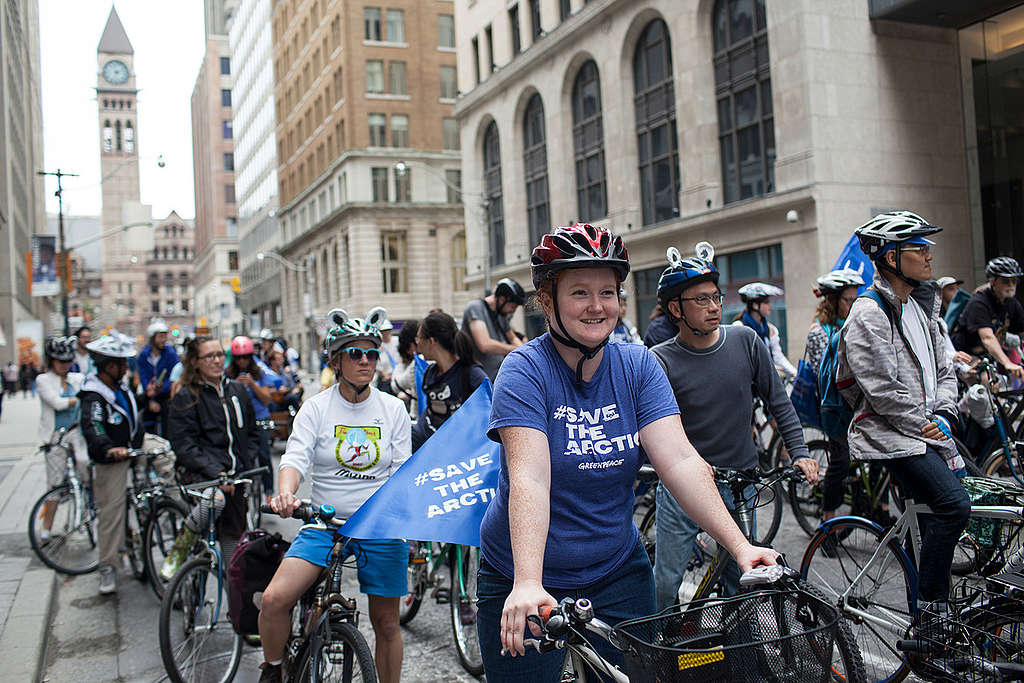
Fundraising for Greenpeace is an incredibly powerful way to make a difference and take action for the planet.
Take action
